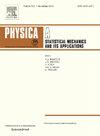从莱顿到欢乐岛:作为享乐游戏的恒定波茨社区检测模型
IF 3.1
3区 物理与天体物理
Q2 PHYSICS, MULTIDISCIPLINARY
Physica A: Statistical Mechanics and its Applications
Pub Date : 2025-09-27
DOI:10.1016/j.physa.2025.130989
引用次数: 0
摘要
社区检测是数据科学中的基本问题之一,它包括将节点划分为不相交的社区。我们提出了一个博弈论的观点,恒波茨模型(CPM)划分网络为不相交的社区,强调其效率,鲁棒性和准确性。效率:我们将CPM重新解释为一个潜在的享乐博弈,将其全局哈密顿函数分解为局部效用函数,其中每个agent的局部效用增益与相应的全局效用增加相匹配。利用这个等价性,我们证明了CPM目标的局部优化通过更好的响应动力学在伪多项式时间内收敛到平衡分区。鲁棒性:我们引入并关联了两个稳定性标准:一个基于鲁棒性新概念的严格标准,要求节点在社区内同时最大化邻居和最小化非邻居,以及一个基于这些目标加权和的宽松效用函数,由分辨率参数控制。准确性:在社区跟踪场景中,初始分区用于使用部分真值信息引导Leiden算法,我们的实验表明,鲁棒分区在恢复真值社区方面产生更高的准确性。本文章由计算机程序翻译,如有差异,请以英文原文为准。
From Leiden to Pleasure Island: The Constant Potts Model for community detection as a hedonic game
Community detection is one of the fundamental problems in data science which consists of partitioning nodes into disjoint communities. We present a game-theoretic perspective on the Constant Potts Model (CPM) for partitioning networks into disjoint communities, emphasizing its efficiency, robustness, and accuracy. Efficiency: We reinterpret CPM as a potential hedonic game by decomposing its global Hamiltonian into local utility functions, where the local utility gain of each agent matches the corresponding increase in global utility. Leveraging this equivalence, we prove that local optimization of the CPM objective via better-response dynamics converges in pseudo-polynomial time to an equilibrium partition. Robustness: We introduce and relate two stability criteria: a strict criterion based on a novel notion of robustness, requiring nodes to simultaneously maximize neighbors and minimize non-neighbors within communities, and a relaxed utility function based on a weighted sum of these objectives, controlled by a resolution parameter. Accuracy: In community tracking scenarios, where initial partitions are used to bootstrap the Leiden algorithm with partial ground-truth information, our experiments reveal that robust partitions yield higher accuracy in recovering ground-truth communities.
求助全文
通过发布文献求助,成功后即可免费获取论文全文。
去求助
来源期刊
CiteScore
7.20
自引率
9.10%
发文量
852
审稿时长
6.6 months
期刊介绍:
Physica A: Statistical Mechanics and its Applications
Recognized by the European Physical Society
Physica A publishes research in the field of statistical mechanics and its applications.
Statistical mechanics sets out to explain the behaviour of macroscopic systems by studying the statistical properties of their microscopic constituents.
Applications of the techniques of statistical mechanics are widespread, and include: applications to physical systems such as solids, liquids and gases; applications to chemical and biological systems (colloids, interfaces, complex fluids, polymers and biopolymers, cell physics); and other interdisciplinary applications to for instance biological, economical and sociological systems.

 求助内容:
求助内容: 应助结果提醒方式:
应助结果提醒方式:


